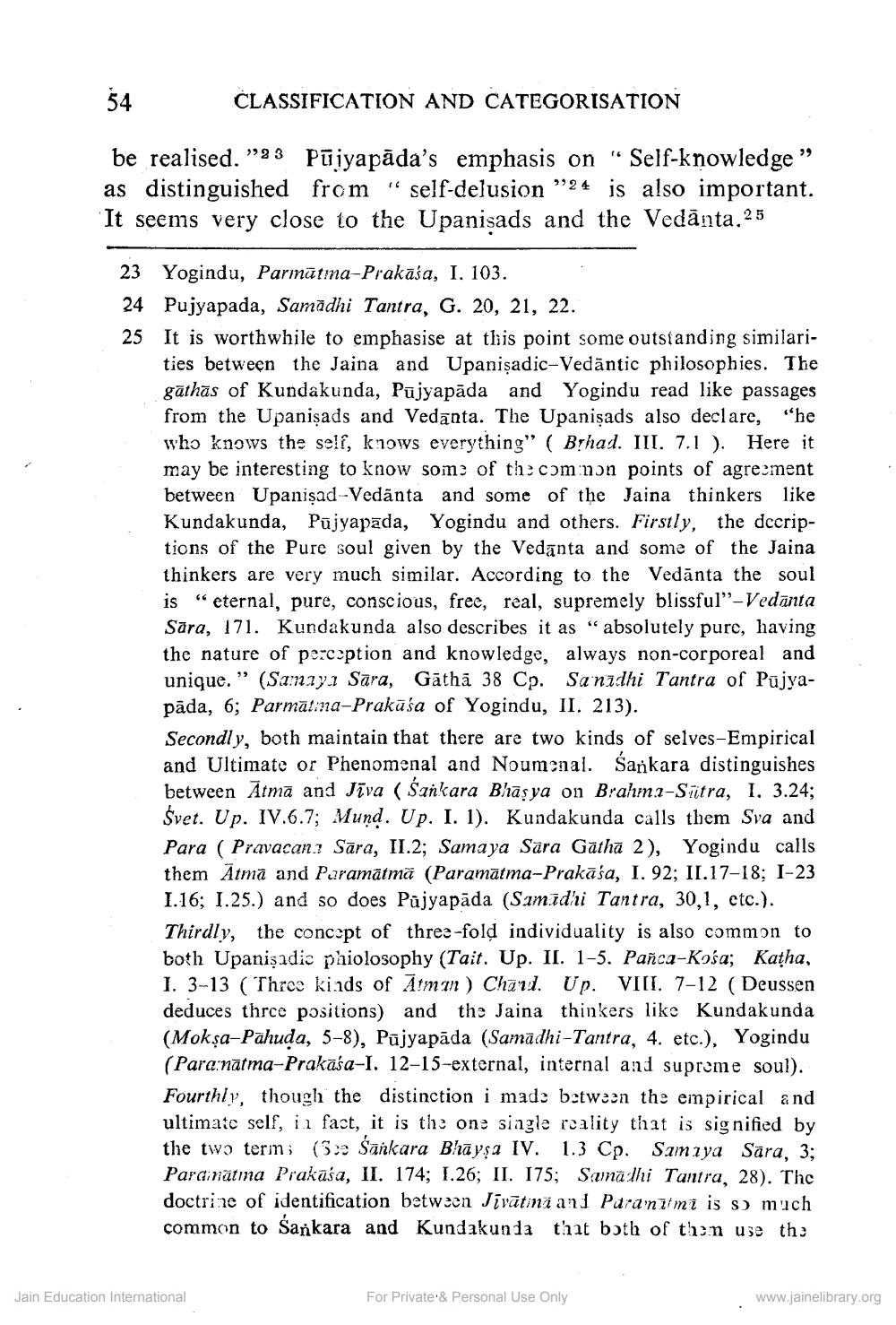________________
54
be realised. "23 Pujyapada's emphasis on Self-knowledge as distinguished from "self-delusion "24 is also important. It seems very close to the Upanisads and the Vedanta.25
CLASSIFICATION AND CATEGORISATION
Jain Education International
to
23 Yogindu, Parmatma-Prakāśa, I. 103.
24 Pujyapada, Samadhi Tantra, G. 20, 21, 22.
25 It is worthwhile to emphasise at this point some outstanding similarities between the Jaina and Upanisadic-Vedantic philosophies. The gāthās of Kundakunda, Pujyapāda and Yogindu read like passages from the Upaniṣads and Vedanta. The Upanisads also declare, "he who knows the self, knows everything" ( Brhad. III. 7.1). Here it may be interesting to know some of the common points of agreement between Upanisad-Vedanta and some of the Jaina thinkers like Kundakunda, Pujyapada, Yogindu and others. Firstly, the decriptions of the Pure soul given by the Vedanta and some of the Jaina thinkers are very much similar. According to the Vedanta the soul is "eternal, pure, conscious, free, real, supremely blissful"-Vedanta Sāra, 171. Kundakunda also describes it as "absolutely pure, having the nature of perception and knowledge, always non-corporeal and unique." (Samaya Sara, Gatha 38 Cp. Sanidhi Tantra of Pujyapāda, 6; Parmatma-Prakasa of Yogindu, II. 213). Secondly, both maintain that there are two kinds of selves-Empirical and Ultimate or Phenomenal and Noumenal. Śankara distinguishes between Atma and Jīva (Sankara Bhasya on Brahma-Sutra, I. 3.24; Svet. Up. IV.6.7; Mund. Up. I. 1). Kundakunda calls them Sva and Para (Pravacana Sāra, II.2; Samaya Sara Gatha 2), Yogindu calls them Atma and Paramātmā (Paramatma-Prakasa, I. 92; II.17-18; I-23 I.16; I.25.) and so does Pujyapada (Samadhi Tantra, 30,1, etc.). Thirdly, the concept of three-fold individuality is also common to both Upanisadic phiolosophy (Tait. Up. II. 1-5. Pañca-Kosa; Katha, I. 3-13 (Three kinds of Atman) Chard. Up. VIII. 7-12 (Deussen deduces three positions) and the Jaina thinkers like Kundakunda (Mokṣa-Pahuda, 5-8), Pujyapāda (Samadhi-Tantra, 4. etc.), Yogindu (Para:natma-Prakasa-I. 12-15-external, internal and supreme soul). Fourthly, though the distinction i made between the empirical and ultimate self, in fact, it is the one single reality that is signified by the two terms (3: Sankara Bhayṣa IV. 1.3 Cp. Samaya Sara, 3; Paramatma Prakāśa, II. 174; 1.26; II. 175; Samadhi Tantra, 28). The doctrine of identification between Jivātma and Paramimi is so much common to Sankara and Kundakunda that both of them use the
For Private & Personal Use Only
29
www.jainelibrary.org




